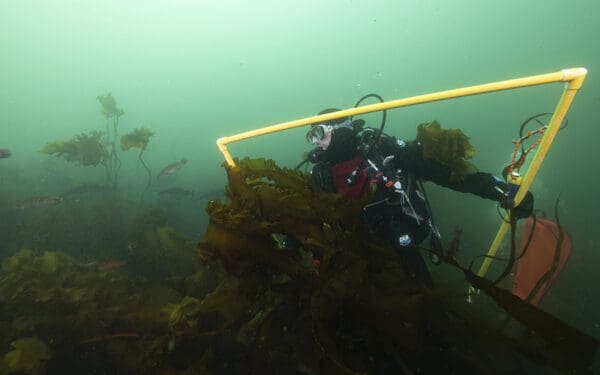
Just nine months into Donald Trump’s second presidency, he’s checked an alarming number of boxes on the Project 2025 wish list. Despite his sometimes hourly flip-flopping, his overall objective is clear: He wants to centralize power in the executive branch while dismantling an imagined “deep state.”
Assuming the mantle of an all-powerful president (or king) who rules by executive order (or royal proclamation), Trump believes he can sideline or even abolish the federal agencies and rules that have long played an essential role in our democracy. And so, in pursuit of, effectively, an absolute monarchy, he’s overstepped every boundary, breached every norm, and effected an all-out assault on our fundamental rights and institutions. As quickly as he has “disappeared” people off the streets, he has also “disappeared” due process, public health, academic freedom, and scientific inquiry. He’s now trying to “disappear” our environment. We won’t let him.
We’re going to court to challenge the Trump administration’s ill-conceived and dangerous environmental policies. The situation is fluid, and every day brings new battles, but we are prepared for – and joining – the fight. Our democracy and environment depend on it.
Defending Vermont’s Climate Superfund Law
United States v. Vermont
What he’s doing: Trump is trying to make life easier for the fossil fuel companies whose products are responsible for the extreme weather we’re experiencing in states like Vermont and New York. The Trump administration is suing both states to block the enforcement of new climate superfund laws that require major fossil fuel companies to pay their fair share of climate change adaptation costs. The administration’s lawsuit is in addition to one filed by the American Petroleum Institute, the U.S. Chamber of Commerce, and a coalition of 24 Republican-led state attorneys general.
What’s at stake: Towns, cities, states, and home- and business owners are currently on the hook for cleanup costs after floods, fires, and other extreme weather ravage neighborhoods. When the flooding recedes, many towns are still swimming in red ink. Under the newly passed laws, the largest contributors to climate change must pay to repair damage and fund adaptation projects after extreme storms caused by climate change.
What we’re doing: Alongside Northeast Organic Farming Association of Vermont, we have already intervened in the industry case against Vermont and have filed a motion to intervene in the case of United States v. Vermont. Our goal is to defend the state’s Climate Superfund Act, which is modeled after the well-established “polluter pays” environmental doctrine. That doctrine underpins existing Superfund laws, which assert that polluters must pay for the cleanup of hazardous waste even if they didn’t intend to pollute. The Trump administration would like Vermont families and businesses to continue paying soaring costs to repair damage and fund adaptation projects after extreme storms caused by climate change. We want polluters to pay their fair share.
Protecting New England Waters from Oil and Gas Drilling
Northern Alaska Environmental Center, et al. v. Trump et al
What he’s doing: President Trump is opening up vulnerable ocean areas to oil and gas leasing.
What’s at stake: Opening vulnerable ocean areas to oil and gas drilling is a reckless gamble with our environment, economy, and public health. The risk? Simply that a catastrophic oil spill will devastate marine life and destroy the vital ecosystems we depend on. CLF has stood against oil and gas drilling in sensitive ocean areas, and especially on Georges Bank, since the 1970s.
What we’re doing: CLF has joined Earthjustice and other groups in a lawsuit challenging this executive order. The case, Northern Alaska Environmental Center, et al. v. Trump et al., challenges President Trump’s order to revoke President Biden’s protections for certain ocean areas. Biden used the Outer Continental Shelf Lands Act to safeguard regions in the Atlantic, Pacific, off the coast of Alaska, and the Eastern Gulf. That Act allows presidents to withdraw offshore areas from oil and gas leasing, a power used by eight administrations, including Trump’s first. However, it does not permit a president to undo previous withdrawals, as a federal court confirmed when Trump attempted to reverse President Obama’s protections for the Arctic and Atlantic oceans.
Defending a Clean Energy Future
State of New York v. Trump
What he’s doing: President Trump doesn’t like the “windmills” we know as wind turbines, so he’s issued a government-wide ban on new wind energy projects.
What’s at stake: The Trump administration wants to keep us tethered to outdated, dirty, and expensive energy sources, like coal, gas, and oil. That’s because his fossil fuel friends rake in billions as the world reels from heat waves, monster storms, flash floods, and fires. If we allow the administration to crush this efficient, clean, and cheap energy source, we have also crushed any hope of reining in the pollution causing our planet to overheat.
What we’re doing: CLF, along with nine other environmental groups, filed a “friend of the court” legal brief arguing that the court should grant the request of states and industry groups to overturn the Trump administration’s government-wide ban on new wind energy projects immediately. Wind energy already accounts for a significant portion of our electricity mix, supporting approximately 131,000 American jobs. The responsible deployment of wind power with critical protections for marine habitats and species is not only possible but also necessary if we want to enjoy clean air and water, meet our goals for cutting climate-damaging pollution, and maintain affordable and reliable electricity.
Protecting New England Communities’ Environmental and Climate Justice Grants
Appalachian Voices v. EPA
What he’s doing: Trump is on a mission to shut down any programs that amplify the values he hates – diversity, equity, inclusion, and justice – including environmental and climate justice. He has therefore abruptly terminated the Environmental and Climate Justice Block Grant Program, which provided funding to community-based organizations and local governments to address urgent environmental and public health issues in historically underserved communities.
What’s at stake: Communities across New England were hobbled when the Trump administration suddenly canceled grants meant to address the health and climate effects of pollution and other hazards. The termination leaves many programs unable to continue the critical work to improve the lives of their constituents.
What we’re doing: CLF has filed a “friend of the court” legal brief in federal court in the case of Appalachian Voices v. EPA on behalf of 17 community-based organizations and local governments whose grants were unlawfully terminated. The brief supports a motion to restore funding while litigation proceeds – and lays bare the devastating impact these cuts have had on frontline communities.
Protecting Access to Affordable Solar Energy
Rhode Island AFL-CIO v. EPA
What he’s doing: The Trump administration has illegally terminated the $7 billion Solar for All program aimed at helping low-income households and disadvantaged communities access clean and affordable solar power.
What’s at stake: The Solar for All program would have delivered residential solar projects to more than 900,000 households nationwide while creating hundreds of thousands of high-quality jobs. At the same time, it would have reduced carbon emissions by at least 30 million metric tons, equal to the emissions of over 7 million typical passenger vehicles. These solar projects would have lowered energy bills while improving air quality.
What we’re doing: CLF, along with the Southern Environmental Law Center, Lawyers for Good Government, and the Lawyers Committee for Rhode Island, filed a legal challenge in federal court on behalf of a coalition of businesses and nonprofits to reverse this shameless attempt to prop up fossil fuel companies at the expense of families.
We are committed to fighting injustice. Stay tuned for further developments as we stand up for the health of our communities and environment.



